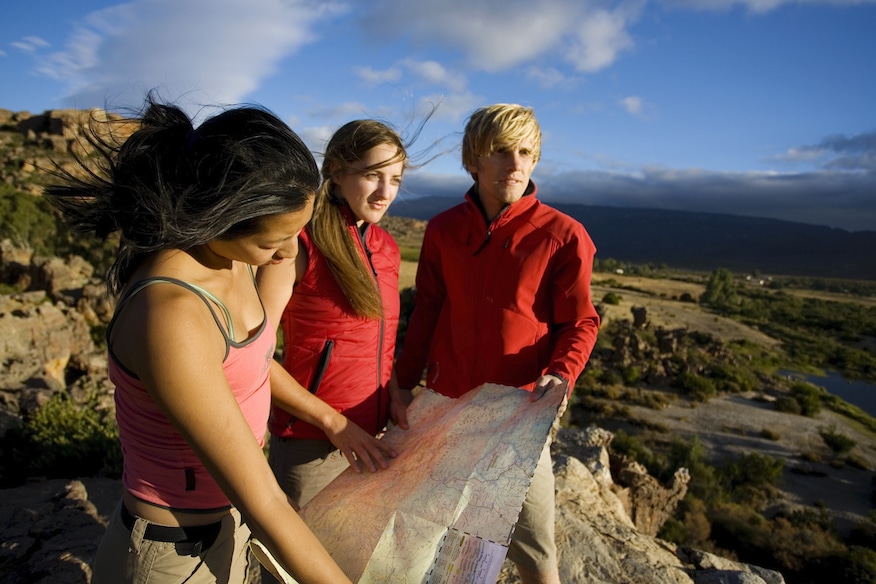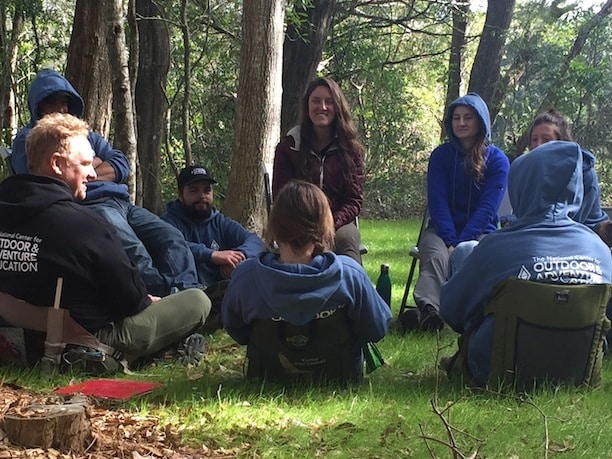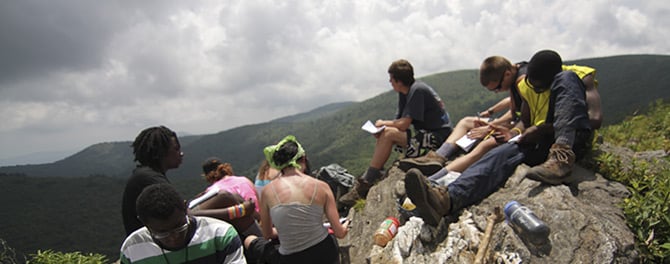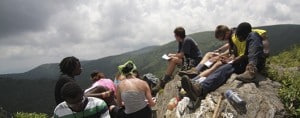NCOAE Embraces Place-Based Learning
NCOAE CurriculumEmbedded in each of our outdoor and wilderness-based experiential education courses is the delivery of place-based learning, which was first introduced by David Sobel in his groundbreaking book, Place-Based Education: Connecting Classrooms and Communities.
Place-based learning connects students to history, landscape, geography, and people through the intense exploration of a specific area which, along the way, serves to help solve the area’s inherent or most recent and/or chronic challenges.
Here at The National Center for Outdoor & Adventure Education (NCOAE), our field instructors are required to research and be knowledgeable about the history, ecology, people, and events that impact a course’s geographical areas. Instructors then share that information with each other, discussing how to tie data to parts of the NCOAE curriculum and/or a client’s Custom Program requirements.
Having this depth of knowledge binds content and curriculum. The result? No topic or subject is taught in isolation. For example, the study of flora and fauna connects to math, literacy, and science. And meeting and knowing people who helped shape the land through writings or active conservation of the area ties into global studies, communication, and environmental stewardship. In this way, place-based learning benefits educators, students, and communities. For instance: (more…)
Leave No Trace Figures Big in NCOAE’s Curriculum
NCOAE Curriculum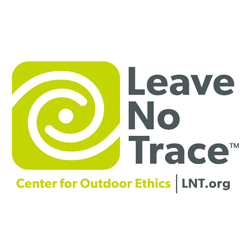 We’re sure the good folks over at the Leave No Trace Center for Outdoor Ethics know this, but tt was Robert Stephenson Smyth Baden-Powell, the father of Boy Scouting, who coined the phrase, “Try and leave this world a little better than you found it.”
We’re sure the good folks over at the Leave No Trace Center for Outdoor Ethics know this, but tt was Robert Stephenson Smyth Baden-Powell, the father of Boy Scouting, who coined the phrase, “Try and leave this world a little better than you found it.”
This retired British Army officer and founder of the scouting movement was adamant about improving the environment back in 1910 — especially on the trail — and his rule was later revised to, “Always leave the campground cleaner than you found it.”
We here at The National Center for Outdoor Adventure & Education (NCOAE) are big fans of this “First Chief Scout,” who among many other wilderness rules, principles and musings, once said, “A week of camp life is worth six months of theoretical teaching in the meeting room.”
Figuratively speaking, that’s a page right out of our own curriculum.
Experiencing the outdoors outside far surpasses any classroom study or indoor book reading on the topic of (more…)
Thoughts on NCOAE’s 2016 ‘Instructor Candidate’ Workshop
Working at NCOAEBy Stephen Mullaney, NCOAE Staff Development Director
When The National Center for Outdoor & Adventure Education (NCOAE) got together to host a multi-day “invitation only” event for instructional candidates, we took the same care as we would when building a campfire.
As a rule, wood doesn’t burn on its own. It’s the gases released, along with a combination of oxygen and ignition that creates the flame. What you need, in fact, is quality fuel, oxygen and ignition.
Here at NCOAE, we have developed, over a period of time, a curriculum that goes well beyond the industry standard and synthesizes best practices that work in wilderness and beyond. Our outdoor education curriculum is our fuel, and it’s the finest fuel to support the courses we offer to students, educators and communities. However, it’s the thought, passion and effort we put into constant improvement that provides the (more…)
Understanding The NCOAE Curriculum, Part 4
NCOAE CurriculumJudging from the headline atop this particular blog post, you can gather that this is the fourth in a series of posts about the curriculum we offer here at The National Center for Outdoor & Adventure Education (NCOAE). And if you haven’t taken a look at the first three installments, it would behoove you to do so (see: Getting to the Core of the NCOAE Curriculum, Part 1; Getting to the Core of the NCOAE Curriculum, Part 2; and, Understanding the NCOAE Curriculum, Part 3).
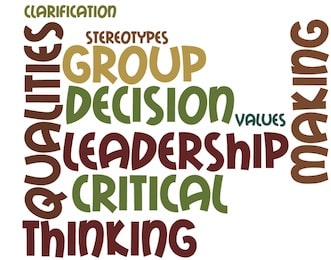 In those three posts, as well as this final chapter on the topic, we discuss the deeper social topics that are covered in our educational groups (Ed Groups), which are a key component to the delivery of our one-of-a-kind curriculum.
In those three posts, as well as this final chapter on the topic, we discuss the deeper social topics that are covered in our educational groups (Ed Groups), which are a key component to the delivery of our one-of-a-kind curriculum.
As background, it’s important to note that the objective of our curriculum is to assist in the development of skills that will help our course participants’ to become even better citizens of the world. That’s a lofty objective, but in our mind, it hovers way above what we can teach about map & compass reading and basic camp craft (which of course we do teach, as well). Because without these particular “people skills,” interacting with others in any environment — outdoor adventures included — can become an unrewarding and unruly undertaking.
In past blog posts on this topic — and again, please read those before continuing forward on this last installment — we discussed such acquirable skills as conflict resolution, civic responsibility, feelings identification and defense mechanisms, to name a few. In this, our fourth and final curriculum series entry, topics include group decision-making, values clarification, stereotypes, critical thinking, and leadership qualities.
Let’s get the ball rolling with our seventh Ed Group topic — group decision making.
Making decisions at the group level can be (more…)
The Importance Of Self At NCOAE
About NCOAEWe have a formula here at the National Center for Outdoor & Adventure Education (NCOAE) and it reads like this: Self + Community + Action = Impact.
In fact, self is the backbone of what we do at NCOAE. It involves our esteem, self-actualization and the decisions we choose to make — all of which are important because we strive to establish a strong sense of esteem in everyone who participates in one of our outdoor education courses.
No matter what the outdoor activity, we provide course participants with countless opportunities to build and reinforce self-confidence. Take backpacking, for example. Here is an opportunity to look back on the trail and say, “I did this. It is an enormous feat in autonomy.” The same holds true for course participants who navigate whitewater for the first time in a raft, or scale up a vertical rock face, or successfully tuck into a tight tube on a surfboard.
Any of these human-powered outdoor activities, when approached with confidence and a good attitude, can’t help but establish a strong sense of self. And getting to know yourself and your limits — actually understanding what it takes to battle through discomfort and arrive successfully at the other end — is a priceless commodity.
Going solo in the wilderness in a controlled scenario is another example that sets you up for successfully establishing a good relationship with yourself that can last a lifetime. Assisted by journal writings, Educational Groups and evening Process Groups, our course participants learn to (more…)
Understanding the NCOAE Curriculum, Part 3
NCOAE CurriculumIt hasn’t been a speedy process but we continue be excited about the deep dive we’re offering up on the curriculum offered here at The National Center for Outdoor & Adventure Education (NCOAE).
As you might recall, our last blog post on this topic covered the educational group (Ed Group) topics of feelings identification, levels of communication/relationships and defense mechanisms. This time around we’re highlighting another batch of three Ed Group topics:
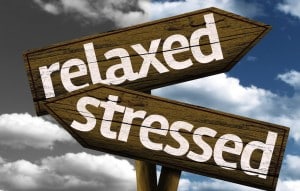 Stress management
Stress management- Clear communication = conflict resolution
- Civic responsibility
Keep in mind that the big takeaway from all this curricula business, is not just to teach our students skills that enable them to become better climbers, hikers, surfers and rafters — but more important, to help them develop the ability to become better human beings and world citizens.
That’s why the NCOAE curriculum specifically deals with human skills. Because, let’s face it. Even on the trail, the honeymoon eventually comes to a screeching halt. And by honeymoon, we’re talking about those first few days of a wilderness excursion. We’re not going all Kumbaya on you, but that’s the time when everybody’s bubbly and happy and getting to know each other and enjoying the views. Problem is, group dynamics change — especially on an outdoor-based adventure.
And it’s most important that our course participants, whether they be preteens or upperclassmen, acquire the tools to deal with those dynamics when they emerge. Because they will emerge on both the trail and in the world from which they came.
So let’s start with our fourth Ed Group topic, stress management:
Outside of a traumatic event, stress usually builds up gradually, so when we arrive the point in an NCOAE course where expose participants to the stress management Ed Group, we ask them to describe personal situations where stress might have raised its ugly head. We ask them to tell us how they reacted — and dealt with stress in the past.
Then we conduct a few activities that offer participants a list of “triggers” and responses to those stresses. Students participate in a timed activity that (more…)
Getting to the Core of the NCOAE Curriculum, Part 2
NCOAE CurriculumIn Part 1 of this series, we told you about the unique curriculum offered here at The National Center for Outdoor & Adventure Education (NCOAE) and the fact that its focus is much more than just developing outdoor skills for our students and adult course participants.
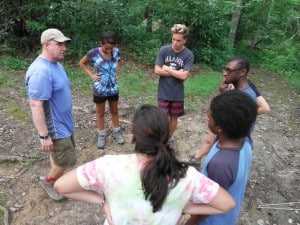
In addition to teaching how to best use nimble feet and hands to ascend a rock face, or selecting the best route around a car-sized boulder in the middle of a fast-moving river, we also like to put the educational emphasis on humanism. And empathy. And self-analysis. To encompass these traits entails mastering the skills of leading, listening and learning.
So, for this — the second installation in our series of blog posts about the NCOAE curriculum — we begin to delve into each one of our 11 Ed Group topics. And we’re going to do that in depth. In fact, we’re going to cover these topics three at a time. That way, we can take our time, explain the topics, and not overwhelm anyone.
As a refresher, at NCOAE, “Ed Group” is short for Educational Group. Our wilderness programs expose course participants to a core curriculum built upon Self, Community, Action and Impact. We factor in 11 topics to be addressed during the daily Ed Groups, and these same 11 topics are revisited for reflection during evening Process Groups (known as “The Summit”). We also have Feelings Check Ins regularly. Each day — sometimes multiple times a day — we have the group circle up for a quick ‘Feelings Check In’, which in one or two words describes how one feels. For example, we typically have one Feelings Check In before starting an activity such as hiking or climbing.
Feelings Identification: Accurately identify our feelings is the foundation on which our curriculum is built upon. During the Feeling Identification group we establish a list of feeling words in order to have productive expression of feelings in the future. The long-term objective here is for folks to instinctively identify primary rather than secondary emotions. Here at NCOAE, we find that distinguishing between primary and secondary emotions is helpful when trying to resolve conflict, communicate personal needs, or manage risks. Here is the skinny on the two:
Imagine the layers of an onion. The inside is the core, where you often find the harder to pinpoint feelings such as (more…)
Getting to the Core of the NCOAE Curriculum, Part 1
NCOAE CurriculumWhen it comes to describing the course of study for a school or university, the word “curriculum” is most often used, and it traditionally references all of the courses offered at a particular institution.
Curriculum has been described as “a path for students to follow,” which is actually fitting when you think about the backcountry activities that are so paramount to our offerings.
What makes that term specific to The National Center for Outdoor & Adventure Education (NCOAE) is that — while our emphasis is on skills related to backpacking, rock climbing, whitewater rafting and surfing — our curriculum doesn’t stop with those outdoor and technical skills.
Unlike many outdoor adventure and education programs, our core curriculum also has a focus on what we call “human” skills, with goals of providing a positive impact on our students’ leadership, communication and their civic and environmental responsibilities. By expanding our understanding of the word curriculum, we’re using experiential education to give our students what is sometimes called “action learning.”
What we’re most proud of is offering relevant and fulfilling educational experiences for youth and adults that are current, effective and rewarding. Our custom curriculum is based on experiential education, which means we value the process of learning actively and hands-on. We use activities and curricula that are problem-based and collaborative. The curriculum encourages our course participants to merge their new outdoor experience with their previous life experiences in order to confront and challenge “obstacles” and find solutions.
Our wilderness programs expose NCOAE course participants to a core curriculum, built upon Self, Community, Action and Impact. We factor in 11 topics to be addressed during the daily Educational Groups (known as “Ed Groups”), and these same 11 topics are revisited for reflection during evening Process Groups (known as “The Summit”).
Outdoor skills are related to students the moment they hit the trail and continue throughout the entire course. Our instructors take full advantage of (more…)
Here’s Why We Love Logan LaPlante, And Why You Should Too!
NCOAE CurriculumAfter recently watching 13-year-old Logan LaPlante discussing his concept of learning during a TEDx (Technology, Entertainment, Design) event in Nevada, our co-founders Zac and Celine Adair jokingly said they want to adopt this self-proclaimed hacker of education.
Young Logan spoke before an audience at the University of Nevada last February, where he discussed the disconnect between education and happiness. The theme of his 11-minute talk – which you can watch via the YouTube embed below – rang true for Zac and Celine, who developed the curriculum here at The National Center for Outdoor & Adventure Education (NCOAE). That curriculum, which we’ll be blogging about in the weeks and months to follow, promotes self, community, action and impact for teens and adults alike.
Wearing a ski cap and the confidence of a veteran circuit speaker, this home-taught youngster who is barely a teen-ager, told the TEDx audience that much of what passes for education is oriented toward making a living rather than making a life. Then he asked, “What would happen if we based education on the study and practice of being happy and healthy?”
We couldn’t agree more. In fact, Celine reminds us that NCOAE’s outdoor and adventure education offerings are designed with improvement in self-actualization, decision-making, and esteem, communication, teamwork, civic responsibility and environmental stewardship in mind.
Equally important is the fact that our course participants have the (more…)
TALK TO US
Have any further questions about our courses, what you’ll learn, or what else to expect? Contact us, we’re here to help!
